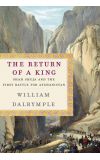
23 Jan 2013 18:06:38
It is a history of the British invasion of Afghanistan in 1839, one of those passages of history the close examination of which requires a strong stomach – and which therefore also require the most thorough investigation. The seductive artistry of Dalrymple's narrative gift draws the reader into events that are sometimes almost unbearable, but his account is so perceptive and so warmly humane that one is never tempted to break away.
What happened during the invasion was largely determined by the personalities of the British men involved, too many of whom were exceptionally arrogant, ignorant and pig-headed; and no novelist is better at portraits than Dalrymple. He is also a subtle scene-setter, so Afghanistan, with its fierce mountains and sweet valleys reminiscent of Kubla Khan's "gardens bright with sinuous rills, where blossomed many an incense-bearing tree", is kept in the reader's mind's eye, along with the striking nature of its inhabitants. And to begin with, during the events leading up to the invasion, the folly of the British is nearer to being comic than appalling.
They were convinced that the Russians were preparing to invade India via Afghanistan in order to undermine Britain's vastly valuable interests there, so they started the "Great Game" in which army officers in elaborate disguises took to the Himalayas in order to spy on and confound the Russians: a romantic but misguided operation that did much to cause the threat it was intended to counter, and was of little help to its masters since when finally one of the Game's leading players sent back sound and important information, it was firmly disregarded. This was just one of innumerable stupid decisions resulting from crass ignorance. By the time the final and worst of them was made it strikes the reader as inevitable.
Afghanistan (then known as Khurasan) was less a nation as understood by the British than a conglomeration of tribes, often hostile to each other, with little in common but loathing of foreign infidels. It was governed in so far as it was governable by whichever of two great families happened to be on top, the Sadozais represented at that time by Shah Shuja, and the Barakzais represented by Dost Mohammad. The latter, who was the abler and more energetic of the two, had recently defeated Shah Shuja and driven him into exile, but true to form, the governor general of India, the Earl of Aukland, brushed off knowledgeable advice and decided that British interests would be best served by ousting Dost Mohammad and reinstalling Shah Shuja as king. This, with impressive pomp and at staggering expense, was achieved, and the British Army occupied Kabul in support of Shah Shuja – and for a short time enjoyed itself there. Indeed, the occupiers were so much at their ease that when Sir William Macnaghten, who was administering the occupation, had his head lopped off, he thought he was at a friendly meeting with his slaughterer. He knew these people, he had declared recently; they were like children.
That was the beginning of horror: the retreat from Kabul, which would have been deeply humiliating even had it gone smoothly, did not go smoothly. The whole of the army occupying Kabul, complete with its thousands of camp followers, had to struggle in deep snow through a very narrow pass between towering cliffs, while for day after day bullets rained down on them from above. It went on for a full week. Very few survived – those who were not shot froze or starved to death.
There were small garrisons elsewhere that survived, and even a number of the army's sepoys who were captured and enslaved; but still the retreat from Kabul was the worst military catastrophe ever suffered by the British. And what happened next was also terrible.
The British had to save face, and there were hostages to be rescued, so an army of retribution was sent in, this time commanded by competent soldiers, so that it achieved its aims soon enough. But horrifyingly, the spirit of hatred and brutality passed from Afghan tribesmen into British and Indian soldiers. They completely wiped out the city of Kabul and everything else they came across, laying waste villages, farms, orchards – the troops made a particular point of destroying trees by debarking them, knowing how essential their trees were to the Afghans. They raped women. They killed children. It was a hideous example of evil breeding evil, and not surprisingly some of the officers welcomed back in India as victorious heroes were so sickened by shame that they found it hard to respond appropriately. Meanwhile, unfortunate Shah Shuja had been murdered by someone who considered that his honour had been offended. The only person to emerge successfully from this, our first invasion of Afghanistan, was Dost Mohammad, the man against whom it had been initiated. He ended up back at the top.
This book would be compulsive reading even if it were not a uniquely valuable history; which it is, because Dalrymple has uncovered sources never used before. To the rich material in British archives and private collections, and in Russian, Urdu and Persian archives, he has been able to add nine previously untranslated full-length contemporary Afghan accounts of the conflict, including the autobiography of Shah Shuja himself. It is this that gives his book its depth and resonance.
In addition, there runs through this story a disturbing undercurrent of relevance. "The closer I looked," Dalrymple says, "the more the west's first disastrous entanglement in Afghanistan seemed to contain distinct echoes of the neo-colonial adventures of our own day." He ends with a conversation he had with two Afghan elders, one of whom remarked: "All the Americans here know their game is over. It is just their politicians who deny this." And one can't put down this book without feeling that the old man is right, and that politicians who know not what they do have been at it yet again.

